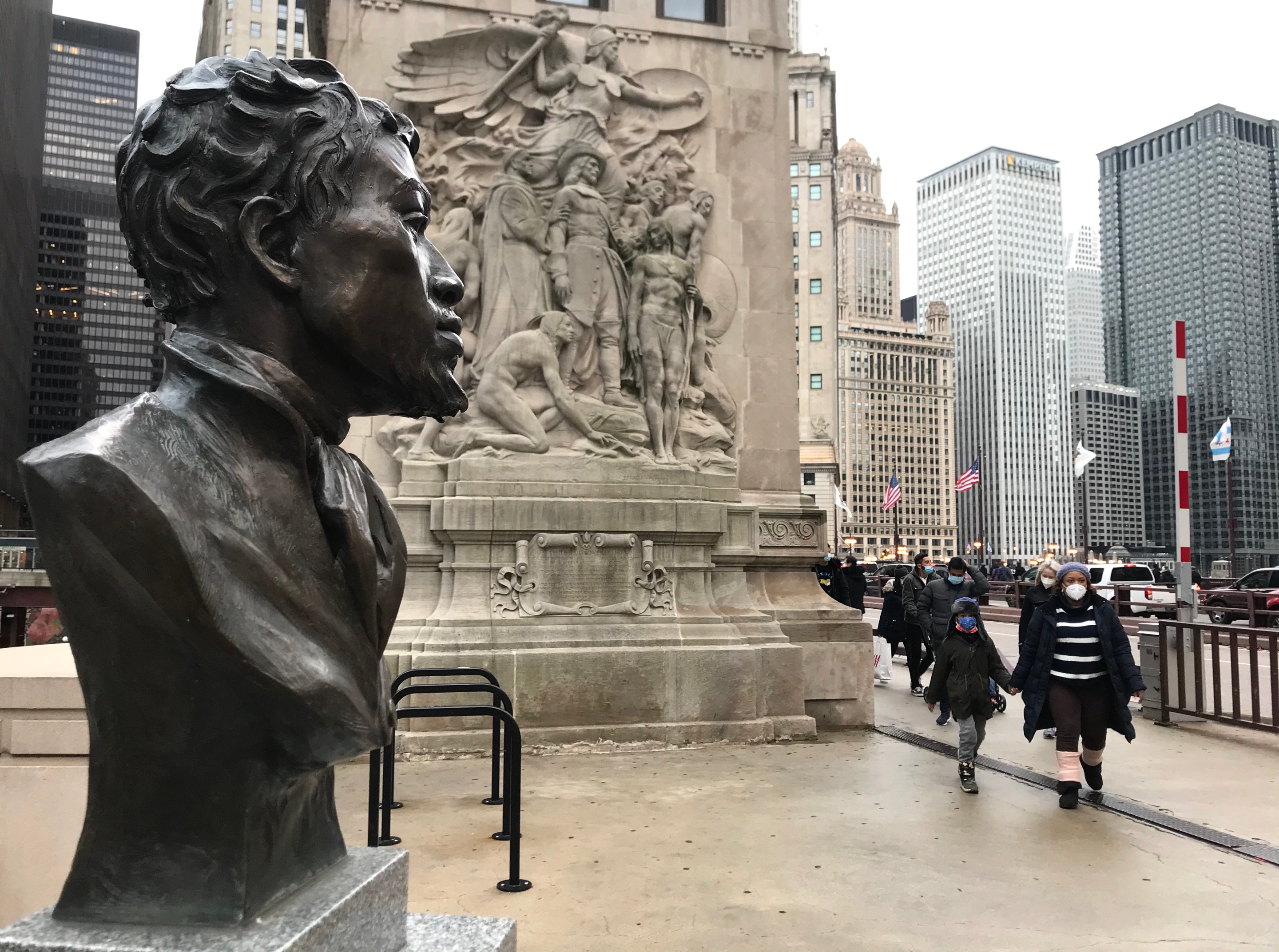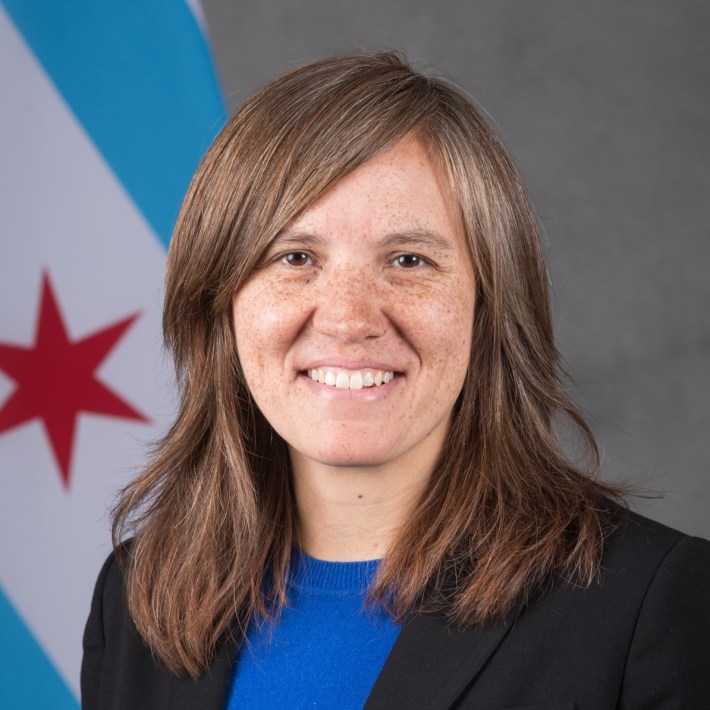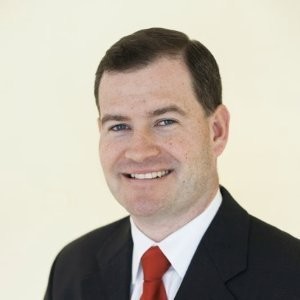During a December hearing at City Hall on the proposal to rename the outer lanes of Lake Shore Drive for Chicago founder Jean Baptiste Point du Sable, transportation commissioner Gia Biagi read a statement that expressed support for honoring the Black pioneer. (I've previously endorsed the plan in a Chicago Reader op-ed.)
Biagi added that the current proposal to rename the outer driver, while retaining the old name for the inner lanes, so that almost no street addresses would need to be changed, would be a complex, but not insurmountable, task. However, internal CDOT emails recently obtained by Streetsblog Chicago show that, behind the scenes, department officials are actually opposed to the name change, and are generally against renaming streets to honor individuals.
Advocates from the group Black Heroes Matter have long pushed for changing the name of LSD to pay tribute to DuSable, as well as establishing a city holiday in his honor, and erecting a 25-foot-tall monument in Grant Park. In October 2019 17th Ward alderman David Moore introduced a new DuSable Drive ordinance, which was discussed at two December meetings of the Council's Committee on Transportation and Public Way. Biagi addressed the aldermen on the committee during the second hearing on December 11, joined by first deputy Chicago Department of Transportation commissioner Tom Carney, deputy commissioner Vig Krishnamurthy, and the department's public way unit manager Bill Higgins.
In Biagi's prepared statement, she noted that Mayor Lori Lightfoot had said the day before that DuSable "played a critical role in Chicago's history and it is long overdue that we honor and recognize his important contributions to our city," and "This is not about a single statue, mural or street, it's about how we uplift the stories of all our city's diverse residents."
Speaking in her own words, Biagi said, "I want you know that I understand the great power of recognition in the naming of our civic spaces -- spaces that can reflect who we were, who we are, and who we might become. I understand that this is about more than changing street signs and addresses and that we have work to do as a city to honor the indelible contributions of Black Chicagoans, from our very founding as a city to the present day."
Biagi noted that the 17-miles stretch of highway is home to about 12,000 residences and over 100 buildings that currently have Lake Shore Drive addresses, adding that this would be the most significant street name change in Chicago's history, requiring considerable administrative work and resources. "This is not to say it cannot be figured out and carried out."
Biagi enumerated some of the hurdles to changing the name. CDOT would need to update all the city systems that depend on geo-location along the drive, which would require working with the Chicago Department of Assets, Information, and Services, plus discussions with the Office of Emergency Management and Communications, Police, and Fire on how to limit any impact on emergency response. In addition, departments like Planning and Development would need to update materials associated with planned developments and lakefront protection.
The commissioner also noted that the amount of labor and materials needed to replace hundreds of signs on Lake Shore Drive would be nothing to sneeze at. She didn't have a total cost figure, but promised to provide committee members with a “back of the envelope” estimate in the near future.
She also pointed out that there is currently no official distinction between "inner" and "outer" Lake Shore Drive, so renaming only the outer lanes would require "physical survey work for the legal description of a new street out of those lanes. We have never done this before. Again, it does not mean it cannot be done, but that there is quite a bit of legal and administrative work to do to figure it out."
However, the emails Streetsblog acquired via a Freedom of Information Act request show that top CDOT officials don't actually want to do that work.
During an email discussion between CDOT brass on December 10 in preparation for the December 11 hearing, Biagi questioned whether Alderman Moore's proposal to rename only the outer lanes of the LSD was actually feasible. "[Moore's] characterization that we can just rename outer drive is incorrect, right? My understanding from the call this morning is that we can’t bifurcate it."
"His characterization that it will be easier or less impactful is incorrect," responded public way unit manager Bill Higgins. "We have never split the name of a right of way that way before. My section's opinion is that it is possible with extensive survey work as described in my earlier email. It will still be costly in signage and also will still cause confusion in emergency response."
Later that day first deputy commissioner Tom Carney asked the city of Chicago's chief technology officer Carleton Nolan and chief data officer Nick Lucius how much work and money it would take to update the city's GIS system if the name change passed. "For your awareness, CDOT is opposed to this as it would trigger significant costs to replace all the signage [as well] as the costs and challenges it would cause for our Maps and Plats and House [Number] Certificates sections."
A few days after the December 11 hearing, on December 14 the Chicago Sun-Times published an editorial arguing "Rather than have aldermen suggest street renaming in an ad hoc fashion as is the case with DuSable, there must be a more formalized and predictable process and criteria by which the recommendation for renaming streets is made."
The next morning on December 15, Biagi emailed Higgins, Carney, CDOT deputy commissioner Vig Krishnamurthy, and managing deputy commissioner Kevin O'Malley about the editorial. "We should consider our position on [this issue] and be ready for the discussion."
Krishnamurthy responded that he and Higgins had been discussing the matter, and had already brainstormed what an administrative process for street name change recommendations could look like. Krishnamurthy implied that in the future CDOT might want to steer advocates away from trying to rename streets to honor individuals, because it's a hassle for the city. "The point we need to emphasize with stakeholders and others who opine on this topic is that the work and disruption involved in renaming streets is orders of magnitude higher than with landmarks [such as statues]," he said. "Thus, step one may be honest public discussion about if we should even do this. We could have a blue ribbon group do an assessment of all current street names and categorize them to understand who and what they already reflect and what biases and disparities exist: named after objects, named after places, named after people (white/colored, women/men)."
"So, it's a bit of a pivot of the conversation," Krishnamurthy added. "Rather than... seeing street names as another vehicle for various interest groups to memorialize their causes, we should start with 'what problem are we trying to solve' within our rolodex of existing street names."
It's not clear that Krishnamurthy's suggestion sat well with Commissioner Biagi. "Could you call me please," she replied.
Later that morning Higgins weighed in on the issue in an email to the group, plus a couple other city officials. "I think it should be CDOT's official policy position that any street name change is discouraged unless it is done to improve consistency across the city grid. Keeping street names consistent and logical is the foremost goal of the Maps and Plats section, minimizing disruption and inconvenience to residents and property owners, while keeping the recognition of existing street names to help maintain wayfinding, addressing, emergency response, and property descriptions."
So to recap, Biagi publicly stated at the December 11 hearing that "it is long overdue that we honor and recognize [DuSable's] important contributions to our city," and that while renaming the outer lanes of Lake Shore Drive for him would require a significant amount of labor and money, "this is not to say it cannot be figured out and carried out."
But privately Biagi's lieutenants stated:
Carney: "CDOT is opposed to this."
Krishnamurthy: "[Perhaps we shouldn't view] street names as another vehicle for various interest groups to memorialize their causes."
Higgins: "It should be CDOT's official policy position that any street name change is discouraged unless it is done to improve consistency across the city grid."
CDOT's quiet opposition to renaming Lake Shore Drive appears to decrease the chances that Black Chicagoans pushing for the name change will be able to achieve their goal of, as Black Heroes Matter leader Ephraim Martin said at one of the December hearings, "[giving] to DuSable what is due to DuSable, Chicago's founding father."








